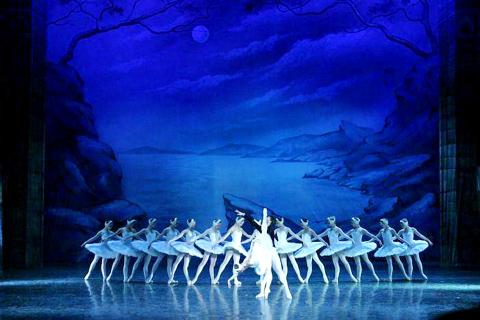The Moscow City Ballet’s swans have returned to Taipei for five shows at the National Theater.
At 27, the company is still a babe compared to its more famous Russian counterparts, the Mariinsky and Bolshoi ballet companies, but it has established a name for itself with competent, if somewhat stodgy, productions of the romantic classics, and its dancers come from state-runs schools in Russia and former Soviet states such as Ukraine.
The private company — a rarity in the Russian ballet world — was founded by former Bolshoi dancer-turned-choreographer Victor Smirnov-Golovanov, who died two years ago. His widow, Ludmila Nerubashenko, a former soloist with the company, is now artistic director.

Photo courtesy of moscow city ballet
The troupe’s strength is in its well-disciplined corps de ballet, crucial if you are sticking to the classics that need flocks of swans, Willies, village maidens or snowflakes who often have to perform two shows a day, as they will tomorrow and Sunday. The principal’s roles are often overshadowed by the mishmash of choreography they are expected to execute, combining the original Lev Ivanov-Marius Petip footwork with additions by Smirnov-Golovanov or other Russian choreographers.
One of the unique features of Smirnov-Golovanov’s production of Swan Lake is Odile’s half-black, half-white tutu that highlights the duality of her role, as she shows the white side to the prince, but the black to the audience.
Taiwanese ballet fans who cannot get enough of Swan Lake would appear to be in luck, as another frequent visitor to these shores, the Russian Festival Ballet, is coming next month with Swan Lake, The Nutcracker and Romeo and Juliet. However, the Moscow City Ballet’s production has better sets and staging.

Photo courtesy of mowcow city ballet
■ Tonight at 7:30pm, tomorrow at 2:30pm and 7:30pm and Sunday at 1pm and 6:30pm, National Theater (國家戲劇院), 21-1 Zhongshan S Rd, Taipei City (台北市中山南路21-1號)
■Tickets are NT$400 to 3,800, available online at www.kham.com.tw or at convenience store ticket kiosks

Google unveiled an artificial intelligence tool Wednesday that its scientists said would help unravel the mysteries of the human genome — and could one day lead to new treatments for diseases. The deep learning model AlphaGenome was hailed by outside researchers as a “breakthrough” that would let scientists study and even simulate the roots of difficult-to-treat genetic diseases. While the first complete map of the human genome in 2003 “gave us the book of life, reading it remained a challenge,” Pushmeet Kohli, vice president of research at Google DeepMind, told journalists. “We have the text,” he said, which is a sequence of

On a harsh winter afternoon last month, 2,000 protesters marched and chanted slogans such as “CCP out” and “Korea for Koreans” in Seoul’s popular Gangnam District. Participants — mostly students — wore caps printed with the Chinese characters for “exterminate communism” (滅共) and held banners reading “Heaven will destroy the Chinese Communist Party” (天滅中共). During the march, Park Jun-young, the leader of the protest organizer “Free University,” a conservative youth movement, who was on a hunger strike, collapsed after delivering a speech in sub-zero temperatures and was later hospitalized. Several protesters shaved their heads at the end of the demonstration. A

In August of 1949 American journalist Darrell Berrigan toured occupied Formosa and on Aug. 13 published “Should We Grab Formosa?” in the Saturday Evening Post. Berrigan, cataloguing the numerous horrors of corruption and looting the occupying Republic of China (ROC) was inflicting on the locals, advocated outright annexation of Taiwan by the US. He contended the islanders would welcome that. Berrigan also observed that the islanders were planning another revolt, and wrote of their “island nationalism.” The US position on Taiwan was well known there, and islanders, he said, had told him of US official statements that Taiwan had not

We have reached the point where, on any given day, it has become shocking if nothing shocking is happening in the news. This is especially true of Taiwan, which is in the crosshairs of the Chinese Communist Party (CCP), uniquely vulnerable to events happening in the US and Japan and where domestic politics has turned toxic and self-destructive. There are big forces at play far beyond our ability to control them. Feelings of helplessness are no joke and can lead to serious health issues. It should come as no surprise that a Strategic Market Research report is predicting a Compound